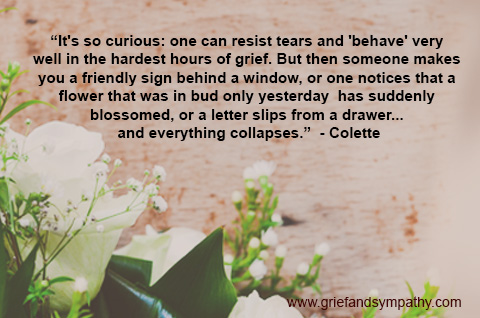Grief Triggers – Should We Avoid or Embrace Them?
Lesley Postle, editor of this site, shares her thoughts and experiences about grief triggers
and how to manage them.

Things that trigger our grief can be varied and occur frequently, and our reactions can be quite upsetting at times. Sometimes people might try and force us to face them, such as wanting us to attend Christmas parties, other times, grief triggers might take us by surprise. Some triggers such as listening to music or looking at photos may be things that we can choose to do or not to do. So should we avoid or embrace our grief triggers?
One of the things I hate most is the word ‘should’ and in my view it’s definitely not a word that applies when talking about grief in any shape or form so let’s look at the choices you do have when it comes to your own grief journey.
One of the greatest misconceptions about grief is that there is some sort of ‘process’ that one goes through, or a formula that you can follow and if you get it right, you’ll somehow come out the other side unscathed.
Sadly, grief doesn’t work like that, and there are as many ways through grief as there are people. We are all unique and we all have our own stories. No-one’s grief is ever going to be the same as yours.
Examples of Grief Triggers
So what am I talking about when I bring up grief triggers then?
I’m sure we all know to a certain extent what triggers us. Even when we are not grieving some of us have things which are automatically guaranteed to start the waterworks. Watching sad movies is likely to set most people off. As a child, I couldn’t watch the show about the dog Lassie without ending up in floods of tears. Anything about animals is still bound to set me off especially if I’m already in a vulnerable state.
But when you’re grieving, there are so many things that can be triggers to kick-start the grieving process and so often they can surprise you or interrupt you at the most embarrassing or inopportune moments.
Some of the more common ones I have come across are:
- Music – songs that our loved one liked, or anything sad, or that has lyrics which speak to us about our loss.
- Smells – these can really take us unawares and come out of the blue. It could be a perfume or a favourite food. Or you pick up an object or piece of clothing that still smells of your loved one.
- Places – visiting somewhere you used to go with your loved one can be a challenge. It might even be difficult to find places where there are no memories if you’re not ready to face them.
- More places – what about places your loved one never saw but would have loved to visit? This one can be really bittersweet and sad if you find yourself there without them.
- Photos – facing photos of a life shared together can be a tough one especially in the early days of grief.
- Clearing out your loved one’s possessions – a challenge whenever you tackle it but you’ll know when you’re ready.
- Birthdays, anniversaries, Christmases - all the occasions the lost loved one is missing.
- Things they never saw or people they never met – for example, I always feel sad that my Dad never saw the house that I currently live in. I know he would have loved it.
- People saying the wrong thing – we are especially sensitive in times of grief and a wrong word or thoughtless comment can be a powerful trigger.
I’m quite sure that there are many more that I haven’t thought of, or haven’t experienced, but the point is, what do we do about these triggers? Are they are good thing or a bad thing?
Facing our Grief Triggers
Certainly facing our grief can be beneficial and help us to come to terms with living with it in the long run. Triggers can also bring back good memories that we don’t want to lose. But when and if we are ready for these triggers is a totally individual matter.
Most of us experience shock in the early days of grief and this can certainly protect us at first. Shock is that feeling of numbness where things don’t feel real yet and we are not feeling everything. We might not cry or react to triggers during that time. You can read more about shock on our page here.
Sometimes it can be therapeutic to face some of our triggers. Many people find it cathartic to listen to sad songs and look at old photos. Others can’t face them. We all know what we need and what we are ready to face. There is no shame in avoiding your triggers if you want, especially if you don’t want to break down in public. You’ll know when you’re ready to grieve and you have every right to do it in your own time.
Some triggers, of course, are unavoidable, such as birthdays and Christmas, but you do not have to join in celebrations if you’re not ready. Be firm about what you can and can’t do at these times. Eventually, you’ll be able to find joy in these occasions again, and use them to bring back precious memories.
When you’re ready, don’t be afraid to visit places that are meaningful. Perhaps do it in honour of your loved one, or for their sake. Acknowledge that you have shared the anticipation and the dream of visiting the place even if you didn’t make it there together. Or treasure the memories if you did make it there.
Try to forgive those who may say the wrong thing. This grief trigger can be one of the hardest to deal with, as it can come out of the blue and we can’t do anything to prevent it. Often, this can make us angry, which is a common response when we are stressed and grieving.
Then our anger can make us feel ashamed or guilty for lashing out. We blame the other person for making us feel like this. But if we step back and think about it, why should others understand exactly what we are feeling. No-one has the same experience as you. Most of us are confused and don’t know how to deal with our grief, so perhaps it’s not surprising that others don’t know what to say to us either.
Sometimes grief triggers catch us unawares too. I remember sitting in a restaurant once with some of my family when the music I sang at my Dad’s funeral suddenly came on. We were with a friend we didn’t know terribly well at the time, and he was rather alarmed when three of us suddenly burst into tears.
I think this was about six months after Dad died, and maybe we were ready for the experience. Sometimes, I think that the universe sends us these messages when we are at the stage when we can face them. You will know when you are ready too.
Related Pages:
How Do You Know You Need Grief Counseling?
- Grief and Sympathy Home
- Dealing with Grief
- Grief Triggers
Where to get help:
Have You Considered One-on-One Online Grief Counseling?
Get Expert and Effective Help in the Comfort of Your Own Home
The following information about online counseling is sponsored by 'Betterhelp' but all the opinions are our own. To be upfront, we do receive a commission when you sign up with 'Betterhelp', but we have total faith in their expertise and would never recommend something we didn't completely approve.
Do you feel alone and sad with no support and no idea how to move forward? It can be tough when you are stuck in grief to find the motivation to get the most out of your precious life.
Online counseling can help by giving you that support so you don't feel so alone. You can have someone to talk to anytime you like, a kind and understanding person who will help you to find meaning in life again, to treasure the memories of your loved one without being overwhelmed and to enjoy your activities, family and friends again.
- Simply fill out the online questionnaire and you will be assigned the expert grief counselor most suitable for you. It only takes a few minutes and you don't even have to use your name.
- Pay an affordable FLAT FEE FOR UNLIMITED SESSIONS.
- Contact your counselor whenever you like by chat, messaging, video or phone.
- You can change counselor at any time if you wish.
- Click here to find out more and get started immediately.
- Or read more about how online counseling works here.
Sales from our pages result in a small commission to us which helps us to continue our work supporting the grieving.
Hypnosis for Grief - 10 Ways It Can Help You
Try a gentle hypnotherapy track to relax the mind. Learn how self-hypnosis can help you cope with grief at any time of the day or night.

For Remembrance:
Sales from our pages result in a small commission to us which helps us to continue our work supporting the grieving.
Memorial Jewelry to Honour a Loved One
Check out our lovely range of memorial jewelry for any lost loved one. Pendants, necklaces, rings or bracelets, we have them all in all kinds of styles. Choose for yourself or buy as a sympathy gift.
Create an Online Memorial Website
Honour your loved one with their own memorial website. Share photos, videos, memories and more with your family and friends in a permanent online website. Free for basic plan with no ads.








